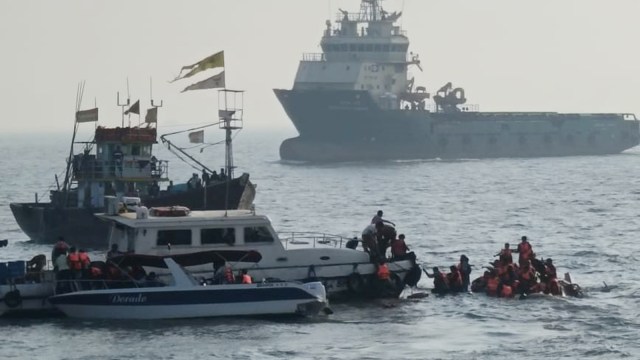Ferry was overloaded, but MMB says law permits a fine of just Rs 200
The Neelkamal ferry, which was hit by a Navy boat leading to the death of 14 people, had more passengers than its licensed capacity of 90 at time of the accident.
 While the board insists that it takes measures to ensure boat fitness, questions remain about the effectiveness of these inspections and whether they go far enough to prevent future tragedies.
While the board insists that it takes measures to ensure boat fitness, questions remain about the effectiveness of these inspections and whether they go far enough to prevent future tragedies.
Even as the Maharashtra Maritime Board (MMB) said that the Neelkamal ferry being overloaded was not a factor that led to its capsize on Wednesday, questions are being raised over the MMB’s oversight of ferry operations in Mumbai.
The Neelkamal ferry, which was hit by a Navy boat leading to the death of 14 people, had more passengers than its licensed capacity of 90 at time of the accident.
The MMB, which is responsible for issuing and regulating licenses for ferry boats, said the crash was caused by the high-speed naval boat hitting the ferry while conducting an engine test, not by overcrowding or any mechanical failure of the ferry.
Moreover, many a times families who take the ferry service prefer to travel together and such cases, the crew allows a a few passengers more, the official said.
In response to the overloading, the MMB has suspended the operator’s license for the Neelkamal ferry.
However, as MMB official confirmed that the board imposes a fine of Rs 200 for each extra passenger carried beyond the licensed capacity as per the provision in law. However, this penalty does not prevent the ferry operator from having their license reinstated once the fine is paid. The official also noted that there are no further restrictions on issuing new licenses to operators who have violated capacity norms.
This relatively small fine has raised concerns, especially in light of the recent tragedy.
While the Rs 200 fine may seem minimal, MMB officials explained that such violations typically result in the detention of the ferry until the fine is paid.
The MMB also follows a rigorous process for issuing and renewing ferry licenses. Each boat is required to undergo an annual fitness inspection conducted by one of the MMB’s four surveyors, who ensure that the boat meets safety and maintenance standards. However, this inspection process is not continuous—surveyors only inspect boats when their renewal applications are submitted.
While the board insists that it takes measures to ensure boat fitness, questions remain about the effectiveness of these inspections and whether they go far enough to prevent future tragedies.







